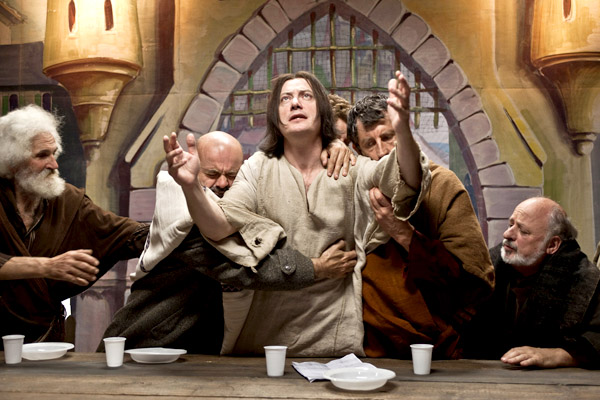|
Reviews of Recent Independent, Foreign, & Documentary Films in Theaters and DVD/Home Video

Open Roads: New Italian Cinema If you can’t make it to the Venice Film Festival, New York’s annual Open Roads festival offers an affordable quick fix. (Granted, the Lincoln Center campus is more welcoming after its costly renovations, but going there’s not quite like hopping from one to screening to another on the Lido.) Six of the program’s films premiered there, mostly in that festival’s all-Italian section, which has given a much-needed shot in the arm to the Italian film industry, which has lagged behind French and even Romanian films in international visibility. Many of this year’s selections were also nominated this spring for a David di Donatello Award, Italy’s equivalent of the Academy Awards. And, as with the Oscars, second-guessing of the top prize is inevitable. In screenwriter Giorgia Cecere’s lovely and unassuming first film, The First Assignment, the plot unravels at a deliberate pace, but not a scene is wasted. She has called it a “Western of feelings,” and it’s true that the headstrong and standoffish Nena (Isabelle Ragonese, outstanding) is an outsider in a provincial 1950 Puglian backwater. Nena doesn’t always understand her neighbors, and as the only single, unmarried woman for miles around, she’s the center of a lot of scrutiny. Fresh from college, the 20 year old accepts a teaching post in a one-room shell of a schoolhouse since her hometown bourgeois boyfriend has been slow in popping the question. The alien-looking, whitewashed-domed dwellings of rural Puglia have been used as a backdrop for decades, and they certainly are a world apart from Nena’s staid middle-class upbringing. If you wanted to catch up on contemporary Italian films, follow the career of in-demand actress Alba Rohrwacher, who makes several films per year with both veteran and up-and-coming directors. She was nominated for best actress for The Solitude of Prime Numbers, a moving adaptation of Paolo Giordano’s acclaimed novel. She’s one of two loners arrested socially and psychologically, both from horrific childhood incidents. Whether as the odd-students-out in high school (where Rohrwacher’s character is the target of the meanest of the mean girls) or as adults, they’re attracted to each other’s uniqueness (or strangeness). Director Saverio Costanzo (Private) thrusts the viewer from one decade to another, never losing momentum or continuity. And it takes nothing away from the rest of the exemplary cast to say that Isabella Rossellini exerts her own force of gravity whenever she appears in her scalding supporting role. She has been away from a meaty role like this for too long.
A similarly mocking, though farcical, spirit is found The Passion, a box office hit and easily the most mainstream film previewed here. A hitless film director (played by the slack-jawed star Silvio Orlando) is blackmailed into directing a Tuscan village’s Good Friday pageant. Gianni might be the most passive and egoless director ever. Looking like the world’s saddest basset hound, he has loser written all over him. Among the subplots, the hammy local weatherman (he demands a real cross to bear) will play Jesus, unless he storms off in a fit.
Anna Magnani on her knees praying. Ingrid Bergman about to toss herself into a volcanic crater. Monica Vitti adrift in L’Avventura. They all appear in clips of an island-by-island film history in Return to the Aeolian Islands, located off the Northern coast of Sicily. For those kvetching for the golden age of Italian Cinema, the documentary offers a rare opportunity to see films that aren’t available domestically on DVD, like Bergman’s Stromboli or Magnani’s Volcano. Director Giovanna Taviani begins with her family’s home movies on the island of Lipari, the location of the Tavani Brothers’ Kaos (her father is Paolo). Look for a young Nanni Moretti. And when the subtitles are hard to read, just sit back and admire the volcanic-formed seascape, which, let’s face, is one of the reasons why some of the featured films here are popular, like Il Postino. A feast for film buffs. (A tidbit of gossip: Bergman and Magnani were filming on neighboring islands shortly after Bergman’s director and husband-to-be Robert Rossellini dumped his former leading lady Magnani.) Like
this year’s Oscar winner,
The King’s Speech, the Italian best picture victor, We
Believed, is a historical drama about something Important, but
as convoluted as the decades-long fraternal battle for Italian
unification. Knowing your Guiseppe Mazzini from your Camillo di Cavour
will help greatly because the script relies more on information than
action—there’s a lot of talk about a constitutional monarchy vs. a
republic. It’s not until around the two-hour mark, during an
assassination attempt on Napoleon III, when the film becomes more than a
history lesson. It’s not surprising to hear a lot of Verdi on the
soundtrack. The composer rallied for the cause of Italian independence,
after all. However, for the first hour of the 205 minutes (you read that
right), the score is the only emotional hook into the film.
Kent Turner
|



